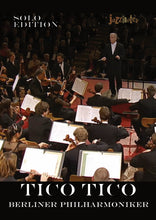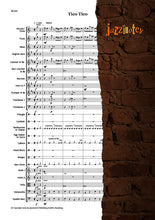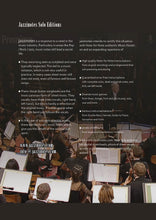Short Description: The sheet music is an arrangement of "Tico Tico (No Fubá)" for orchestra in the interpretation of the Berlin Philharmonic Orchestra under the direction of Daniel Barenboim. It is arranged very close to the original recording. Score and parts are included.
Licensed Territory: worldwide
Instrumentation: Orchestra
Instruments: Piccolo, Flute, Oboe, English Horn, Clarinet, Bass Clarinet, Bassoon, Horn, Trumpet, Trombone, Percussion, Violin, Viola, Violoncello, Double Bass
Interpreter: Berlin Philharmonic / Daniel Barenboim
Music by: Zaquinha de Abreu
Level: 4 (of 5)
Pages: 65 (21 score + 44 parts)
Order No. 101-850-8025d
Guarantee: yes
Video: Please click on the video icon above!
Songfacts:
Tico Tico (no Fubá), a Brazilian golden oldie, was composed in 1917 by Zequinha de Abreu. ‘Tico tico’ refers to a kind of bird, and ‘Fubá’ is a type of cornmeal – so the title means something like ‘Tico tico on the Cornmeal’. Among the song’s most famous interpreters are Carmen Mirandea (in 1947 film Copacabana), Ray Conniff and Paco de Lucia. The melody also appears on the soundtracks of many films, for example Saludos Amigos (Walt Disney 1942) and und Radio Days (Woody Allen 1987).
The jazzinotes edition of Tico Tico is based closely on the original recording of the Berlin Philharmonic Orchestra conducted by Daniel Barenboim, a live recording, viewable as a YouTube video (click above)
Recommendations concerning the instrumentation:
This Arrangement tries to support you in your instrumentation. It is very flexible:
- There is also a C part for each of the transposing instruments (English horn, Bb clarinet, Bb bass clarinet, F horn and Bb trumpet). This instrument can be replaced or doubled by a C instrument, in particular by a synthesizer.
- The percussion instruments can be varied and combined in different ways. For example, the shaker can also be played by a guiro. You find the combined par “Percussion” for this.
- The interpretation of the lead melody in the prescribed fast tempo sometimes requires virtuoso skills. The melody can be simplified by omitting individual notes.
Attention: We also offer two piano versions: in the interpretation of the Oscar Peterson Trio and of Martin Schmitt.
Transposition:
We can transpose this tune for you. This is how it works:
1. Order it in the original version.
2. Order our article Transposition B.
3. Send an informal email to info@jazzinotes.com (subject:“Transposition”). In the email please indicate the title of the original as well as the key desired.
You’ll receive the transposition within a couple of days as a pdf file you can open using your password for the original version.







